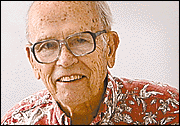Advertisement - Click to support our sponsors.


Hawaii’s World
CHINN Ho became a legendary figure in post-World War II Hawaii by using a hui system to raise enough money to break into the community's mostly white-controlled business structure. Chinn Ho’s grandson
puts new twist on
old hui ideaMultiracial friends pooled less than $40,000 to form Capital Investment Co. in 1944, when the end of World War II was in sight. They designated Ho to be their sole investment decision-maker.
Early on Ho was able to increase Capital's assets with relatively small real estate transactions.
Then came 1947 and one of the most talked-about acquisitions ever made in Hawaii. Without haggling, Ho agreed to pay the full $1.25 million asking price for Waianae Sugar Co., which owned all of Makaha Valley. The Big Five firm selling it was startled that a non-Caucasian could put that much money on the line. It so excited the local community that friends swamped Ho with calls wanting to help pay the then-massive bill.
Ho moved on to build a major hotel-condominium (the Ilikai) and became the first Asian American to head a Honolulu daily newspaper, the Honolulu Star-Bulletin, which he later sold to Gannett Co.
Last week, I heard Ho's grandson, David A. Hong, tell a high-tech conference how his mainland firm used "angel money" from trusting friends and family to start up a company that today has paid-in capital of $40 million, 150 employees and over 1,800 customers.
VitalLink began two years ago when its three founders pooled $50,000 of their own, then built up another $1 million in investments from friends and family who trusted them and their business concept.
This "angel money" compares quite closely with the hui concept used by Hong's grandfather.
For a modest monthly fee of perhaps $100 or $200, VitalLink offers small businesses many of the advantages electronic business brings to large companies.
Examples of some 20 offered services: Constant video surveillance of properties, instant data processing, instant tallies of a day's receipts even if spread among several branches.
With their $1 million of "angel money" raised by February 1999, the founders sought venture capital from experienced investors and business people who liked their concept and could provide know-how and talent to help.
THESE investors likewise got shares in VitalLink but paid an average $4.91 for each one versus $1 a share for the angels. The angels' investments thus rose in value even though their percentage of shares in VitalLink diminished.
VitalLink is based in San Francisco with offices in Los Angeles, Dallas, New York, Houston and Chicago. Its growth curve points up.
The angel-capital-to-venture-capital progression is common for start-up businesses today, Hong told the HiTech Hawaii@2000 conference at the Hilton Hawaiian Village.
He is a 1988 Punahou School graduate, trained also at Columbia University and Georgetown Law Center. He migrated to San Francisco to start his business career. His introducer when he spoke was his father, Stanley Hong, president and CEO of the Chamber of Commerce of Hawaii.
The senior Hong said that to suggest that Hawaii's sons and daughters should not leave the state is a self-imposed form of isolation and counterproductive to all concerned. Those who succeed elsewhere, he said, usually leave their hearts in Hawaii and come on occasions such as last week's to share their knowledge and experience.
A.A. Smyser is the contributing editor
and former editor of the the Star-Bulletin
His column runs Tuesday and Thursday.